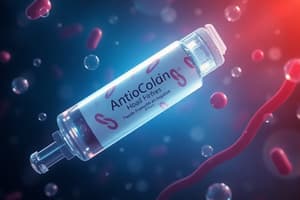Podcast
Questions and Answers
Which formulation of heparin is most widely used for plasma and whole blood chemistry tests?
Which formulation of heparin is most widely used for plasma and whole blood chemistry tests?
- Calcium heparin
- Lithium heparin (correct)
- Sodium heparin
- Ammonium heparin
What is the optimal anticoagulant concentration of heparin for use in blood studies?
What is the optimal anticoagulant concentration of heparin for use in blood studies?
- 15-20 units/mL (correct)
- 10-15 units/mL
- 5-10 units/mL
- 20-25 units/mL
What action does sodium citrate perform in coagulation tests?
What action does sodium citrate perform in coagulation tests?
- Inhibits platelet activation
- Neutralizes thrombin
- Chelates calcium (correct)
- Promotes clot formation
Which of the following is NOT a consequence of using heparin as an anticoagulant?
Which of the following is NOT a consequence of using heparin as an anticoagulant?
What is the critical ratio for sodium citrate when used in coagulation tests?
What is the critical ratio for sodium citrate when used in coagulation tests?
What effect does excessive agitation have on coagulation test results?
What effect does excessive agitation have on coagulation test results?
Which heparin formulation should not be used for sodium level determination?
Which heparin formulation should not be used for sodium level determination?
What result may be indicated by the presence of clots in a coagulation test?
What result may be indicated by the presence of clots in a coagulation test?
Flashcards
Heparin anticoagulant
Heparin anticoagulant
A substance used to prevent blood clotting, neutralizing thrombin, best for plasma chemistry and blood gas studies.
Heparin tube inversions
Heparin tube inversions
Must be inverted 8 times to ensure proper mixing and anticoagulation.
Sodium Citrate Ratio
Sodium Citrate Ratio
A 1:9 ratio (Harr) is critical for accurate coagulation testing.
Sodium Citrate use
Sodium Citrate use
Signup and view all the flashcards
Excessive Mixing (Coagulation)
Excessive Mixing (Coagulation)
Signup and view all the flashcards
Heparin formulations
Heparin formulations
Signup and view all the flashcards
Lithium Heparin
Lithium Heparin
Signup and view all the flashcards
Heparin Interference
Heparin Interference
Signup and view all the flashcards
Hemolysis effect (Coagulation)
Hemolysis effect (Coagulation)
Signup and view all the flashcards
Prolonged Tourniquet Application
Prolonged Tourniquet Application
Signup and view all the flashcards
Coagulation Test Factors
Coagulation Test Factors
Signup and view all the flashcards
Study Notes
Heparin
- Found in: Green top tube
- Inversions: 8x
- Used for: Plasma chemistry and blood gas studies
- Optimal anticoagulant concentration: 15-20 units/mL
- Action: Neutralize thrombin
- Choice anticoagulant for: OFT and blood gas studies
- Three heparin formulations:
- Ammonium heparin
- Sodium heparin
- Lithium heparin (least interference in chemistry testing; most widely used for plasma and whole blood chemistry)
- Important reminder:
- Lithium heparin: Not for lithium level determination.
- Sodium heparin: Not for sodium level determination or electrolyte panel.
- Ammonium heparin: Not for ammonia level determination.
- Heparin causes cellular clumping (especially of platelets), leading to pseudoleukocytosis (falsely elevated WBC count) and pseudothrombocytopenia (falsely reduced platelet count).
- Not used for blood smear preparation due to morphologic distortion of platelets and leukocytes.
- Causes bluish coloration of background on blood smears stained with Romanowsky stain.
- Not used for coagulation studies due to inhibiting thrombin.
3.2% Sodium Citrate
- Found in: Light blue top
- Inversions: 3-4
- Used for: Coagulation tests
- Critical ratio between anticoagulant and blood: 1:9
- Action: Chelation of calcium
- Forceful mixing/excessive inversions can activate platelets, shortening clotting times.
Factors Affecting Coagulation Test Results
- H (Hemolysis): Prolongs coagulation test results
- E (Excessive agitation): Shortens coagulation test results
- P (Prolonged tourniquet application): Prolongs coagulation test results
- E (Excessive needle manipulation): Prolongs coagulation test results
- P (Platelet contamination): Prolongs coagulation test results
- Presence of clots: Prolongs coagulation test results
- Increased AC concentration: Shortens coagulation test results
Studying That Suits You
Use AI to generate personalized quizzes and flashcards to suit your learning preferences.




